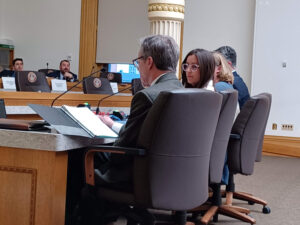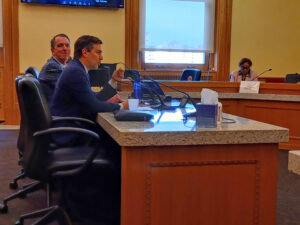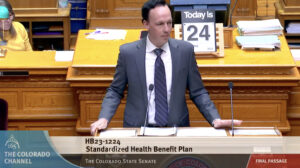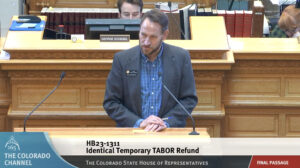When Democrats swept the November elections and claimed their largest majorities in legislative history — after more than a few campaigned for new environmental and workplace regulations — the feeling was that business could be in for a long 2023 session.
And by any measure, it was a very long one, with legislators working late nights and weekends since March and groups such as trade associations and chambers of commerce having to dispatch representatives constantly to explain opposition to bills. But, as the dust begins to settle on a 120-day session that ended late Monday, the number of bills headed to Gov. Jared Polis’ desk that significantly bother business groups are surprisingly few.
Over the course of the past four months, business and industry groups — working often with local-government associations and not infrequently with state agencies — managed to fully kill an array of bills that threatened to boost operational costs or difficulty.
The R.I.P bill list
By bipartisan votes, legislators put down proposals to overhaul scheduling in the retail and restaurant sectors, allow local governments to implement rent-control measures, require unprecedented record sharing in the gig-transportation sector and offer expanded unemployment benefits at a time when the Unemployment Insurance Trust Fund remains insolvent. A bill to study implementation of a single-payer healthcare system died on the Senate calendar near the end of session, and a circulated proposal that could have added nearly $200 million in costs to the state’s workers’ compensation system never received introduction.
And on several bills that could have produced seismic results in their original forms, business leaders managed to negotiate them down to mutually acceptable levels or eliminate provisions that could have proven to be damaging.

Colorado Chamber of Commerce board chairman John Jacus testifies against HB 1294 in a committee in April as Colorado Competitive Council Executive Director Rachel Back looks on.
Senators stripped an antitrust update law of a provision that could have spawned construction-defects litigation against single-family homes. A bill to ramp up air-quality permitting requirements significantly for minor sources of pollution morphed into a measure to create an interim legislative committee to study the issue without the ability to introduce bills. Even a bill that would broaden the definition of sexual harassment if signed into law passed only after going through long-running negotiations that produced several major changes.
Business-opposed bills still passed
In the end, the bill going to Polis that continues to give business groups the most heartburn is one that would update the Equal Pay for Equal Work Act by doubling the number of years of backpay that employers could have to turn over if found guilty of violating the act. But that bill and an equally opposed but heavily amended proposal to create a first-in-the-nation right of first refusal for local governments on many apartment complexes that go up for sale weren’t the biggest worries for many business groups at the start of the session.
As such, the number of successful bills that chambers of commerce abjectly opposed was fewer this year than the number of bills that such groups supported fully on their way to passage. Legislators, after all, passed two measures to pump $100 million into getting students degrees and credentials in labor-challenged sectors, created tax incentives for semiconductor makers and approved new tax breaks for employers who help workers to save for home purchases.

Colorado Senate Minority Leader Paul Lundeen smiles while Sen. Jeff Bridges testifies for a workforce-development bill in April.
Loren Furman, president/CEO of the Colorado Chamber of Commerce, acknowledged that getting to an acceptable outcome from this session took a lot of work and a lot of collaboration with organizations from the Colorado Restaurant Association to the Colorado Municipal League. But at a time when Colorado’s economic competitiveness is slipping on the national landscape, as argued in a recent report from the Common Sense Institute, the bills that passed aren’t likely to lead to significant further deterioration in that area, she said.
“We are seeing a direct correlation between our laws and rights and this competitiveness data in the surveys we’ve done — a direct correlation to the companies that are moving or locating outside of Colorado,” Furman said. “And it could have deteriorated our business climate more. So, I would say there is some relief about the way the session came out.”
New representatives swamp legislative session

Most of the first-year members of the Colorado House pose for a photo Monday at the start of the session’s final day.
In addition to facing the most heavily partisan Legislature in recent memory, interest groups of all ideologies went into the session dealing with 32 new representatives or senators, creating a great unknown as to how those first-year officials would interact with outside groups. And, particularly because 30 of the 32 new legislators were in the House and brought with them more liberal or conservative ideologies than holdover officials, that chamber proved more willing to pass legislation without significant changes from its introduced form, leading Rep. Mary Bradfield, R-Fountain, to complain that “compromise is not a word that’s expressed in this chamber or allowed.”
As a result, it fell to a handful of more moderate or pragmatic Democratic senators to make major changes to business-opposed bills or to strike the bills altogether.
Sen. Dylan Roberts, an Avon Democrat who moved to the Senate from the House in the November election, pushed for significant changes to the right-of-first-refusal bill, yanked the expansion of the Colorado Consumer Protection Act from the antitrust update legislation and cast the deciding vote to kill the rent-control ordinance. Democratic Sens. Rachel Zenzinger of Arvada, Kyle Mullica of Federal Heights and JoAnn Ginal of Fort Collins also played key roles either as swing votes or behind-the-scenes voices pushing for moderation, several sources said.

Colorado state Sen. Dylan Roberts speaks on the Senate floor in April.
Polis administration steps in
While Polis himself didn’t ask for a lot of bills to be killed, heads of his agencies played key roles in toning down legislation that they called impractical or nearly unenforceable by the state. The Colorado Department of Labor and Employment explained the potential danger in adding new unemployment benefits right now, while both the Colorado Oil and Gas Conservation Commission and Colorado Department of Health and Environment said that provisions in the air-quality permitting reform bill would have interfered with their ongoing work or required them to add massive amounts of new workers to enforce the measures.
CDLE Executive Director Joe Barela stepped in when a half-dozen new bills and three existing laws sought to take enforcement funding from the Employment Support Fund that helps to pay for UITF administration and local workforce-training grants. He intimated that he would ask Polis to veto any bill that passed with such funding, and his stridency led legislators to yank ESF money from any new bill.
Tony Gagliardi, Colorado director for the National Federation of Independent Business, agreed the session turned out better than expected, pointing particularly to a bill that removed burdensome regulations on the 10-month-old retail delivery fee as a win for small business. But Gagliardi also cautioned that even the pared-down bills, such as the Protecting Opportunities and Workers’ Rights (POWR) Act that changes the definition of harassment, could still have more impact on smaller firms than larger companies.
“That’s great for big businesses. But my members, if there’s a problem, they still need to reach over and pick up a phone and call an attorney that they have to pay for, because they don’t have in-house attorneys,” Gagliardi said. “So, while some of the stuff gets watered down and easier, it’s easier for big businesses.”
Other big issues in legislative session
Some of the biggest issues this session didn’t fit easily into pro- or anti-business categories.

Colorado state Rep. Chris deGruy Kennedy explains one of two connected bills he is sponsoring to offer property-tax relief while disrupting the TABOR refund formula.
Commercial property owners are in line, for example, for a $3.5 billion break on their property-tax bills over the next 10 years as compared to what would happen without action if a ballot measure set up by the late-session Senate Bill 303 passes in November. But they must balance whether that benefit is worth giving up receipt of full Taxpayer’s Bill of Rights refunds in the short term and possibly giving them up altogether in the long term.
Similarly, a failed land-use reform bill would have taken steps to address the housing shortage that’s led to spiking home costs and made it harder for businesses to find workers who can live a reasonable distance from their offices or factories. But the bill created myriad questions about the role of the state versus local governments in determining local development, and it likely will be negotiated again over the next eight months before the start of the 2024 session.
What’s next
With so many policies touted by the incoming representatives meeting their ends or getting watered down this session, questions remain on whether that experience will leave some of the newcomers pushing harder for ideologically rigid bills next year. Furman said she hopes that whatever comes will be negotiated with stakeholders over the interim rather than introduced and attempted to jam through in the closing months of the session, as was the case with too many bills over the past 120 days.
“It creates a lack of opportunity for diplomacy, for collaboration, for having a thoughtful process in policy. And that’s a critical step for making good policy,” she said. “And that’s one of the reasons why you see such a contentious atmosphere at the Legislature right now.”
